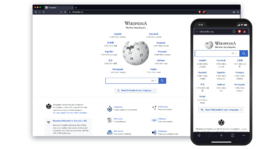Brave (web browser) facts for kids
 |
|||||||||||

|
|||||||||||
| Developer(s) | Brave Software, Inc. | ||||||||||
|---|---|---|---|---|---|---|---|---|---|---|---|
| Initial release | 12 Oct 2016 v1.0.3 (Android) 14 Dec 2018 v1.7 (iOS) |
||||||||||
| Stable release(s) | |||||||||||
|
|||||||||||
| Written in | JavaScript, Swift, C++ | ||||||||||
| Operating system |
|
||||||||||
| Platform | x86, x86-64, IA-32, ARM, AArch64 | ||||||||||
| Type | Web browser | ||||||||||
| License | MPL 2.0 | ||||||||||
Brave is a free internet browser that was first released in 2016. It is made by a company called Brave Software, Inc. and is built on the same base as Google Chrome, called Chromium.
Brave is special because it focuses on your privacy. It automatically blocks annoying ads and trackers that try to follow you online. It also helps protect you from "browser fingerprinting," which is when websites try to identify you by your computer's unique settings. Plus, it has a private browsing mode that uses a special network called Tor for extra privacy.
Brave also has a unique way to show ads. Users can choose to see privacy-friendly ads and earn a digital currency called Basic Attention Tokens (BAT). These tokens can then be used to support websites and content creators. While many people like Brave's privacy features, it has faced some questions about how it handles ads and links.
Contents
Brave Browser: A Look at Its History
How Brave Started (2015–2016)
Brave Software was created in 2015 by Brendan Eich, who also invented JavaScript. He teamed up with Brian Bondy, another programmer. In 2016, they launched the Brave browser. Their main idea was to create a browser that would block ads and trackers by default. This meant a more private and faster internet experience for users.
Growing and Changing (2016–2018)
In 2016, Brave Software bought an Android browser app called Link Bubble. This app would load websites in the background. Link Bubble was then renamed Brave, but its unique way of working was confusing for some users. So, in 2017, Brave was re-released as a more traditional browser with tabs. Link Bubble continued as a separate app.
In 2017, Brave introduced the Basic Attention Token (BAT). This is a type of cryptocurrency based on Ethereum. The idea was that people viewing content could pay creators directly using BAT, instead of creators relying only on ads. The project raised about $35 million to get started. By 2018, BAT was part of the Brave Rewards system. Users could earn BAT by watching ads through the browser and then use it to support their favorite creators.
Until late 2018, Brave was built using a special framework called Muon. In October 2018, Brave decided to switch to building the browser on top of the Chromium codebase. Chromium is the same base used for browsers like Google Chrome. Brave made this change to make the browser work better and be easier to maintain. This switch made Brave 22 percent faster than its older versions. The last Muon-based Brave was released in January 2019, and users were encouraged to move to the new Chromium version.
Brave's Growth and New Features (2019-Present)
In 2019, Brave released its 1.0 version for all devices. This meant the browser was no longer in testing and was ready for everyone to use. The 1.0 release also brought the Brave Ads system to iOS devices. Users could now sell their Basic Attention Tokens (BAT) on cryptocurrency exchanges through a partnership with a company called Uphold. This allowed users to turn their BAT into US dollars.
In 2020, Brave added Brave Today, a news feed that appears on the browser's new tab page. This feature provides personalized news without sharing your location or other private information with news publishers. It uses Brave's own network to deliver the news. Later, this feature was renamed Brave News.
Also in 2020, it was found that Brave had added special codes to the end of website addresses for some cryptocurrency companies. This happened when users searched for terms like "bitcoin" or "ethereum." Brave's CEO, Brendan Eich, said this was a mistake and that such advertising would only be added if users chose to turn it on.
On March 3, 2021, Brave Software announced they bought Tailcat, a search engine focused on privacy. In October 2021, Tailcat became Brave Search and was set as the default search engine for new Brave installations. In the same year, Brave also launched a cryptocurrency wallet built right into the browser. They said it was safer from online scams than other similar tools.
In 2023, Brave launched Brave Leo. This is an AI assistant built into the browser that helps summarize web pages and answer questions about them. Brave says it keeps user data private by hiding your IP address and not storing logs of your interactions. In 2024, Brave Leo became available on Android and iOS devices, and AI features were also added to Brave Search.
See also
 In Spanish: Brave (navegador web) para niños
In Spanish: Brave (navegador web) para niños
 | Misty Copeland |
 | Raven Wilkinson |
 | Debra Austin |
 | Aesha Ash |

